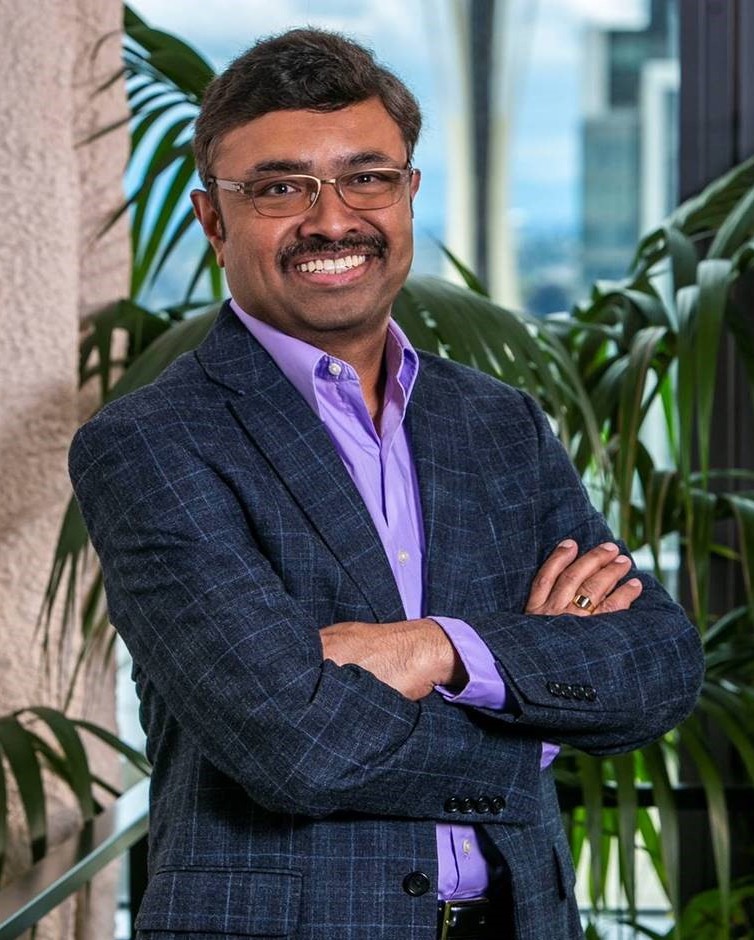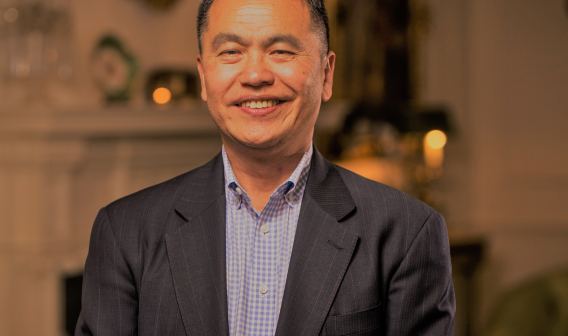Our ability to apply data and AI to understand our customers’ needs, goals, and pain points means we’re in an unprecedented position to continue delivering the right help at the right time. It means we can continue to deliver tremendous value to people in all different spheres of their lives, and we can do it at scale to over 100 million customers.
VEDP: What led you to shift from academia to industry when you moved over to Amazon? How are your experiences in both fields guiding you as you fulfill your role on the UVA School of Data Science (SDS) Advisory Board?
Natarajan: Throughout my professional life, whether in academia or industry, I have been drawn toward the pursuit of technological advances that help transfer everyday cognitive burdens from a human user to an AI system. The appeal of delivering AI-powered experiences to millions of people through a conversational AI assistant was what drew me to join Amazon.
Subsequently, after several years at Amazon, when I started thinking about the next frontier of challenges I wanted to tackle in my career, I kept coming back to the verticals where AI had the most potential to impact the most lives. It came down to a few specific industries, and ultimately finance rose to the top of my list. Money, and especially access to financial services, impacts all our lives in a fundamental and enduring way. The prospect of bringing the power of AI to transform and simplify that access is deeply exciting. That, coupled with their reputation as the financial services leading technology enterprise, led me to Capital One.
Every industrial enterprise thrives on talent that emerges from academia. But in areas like AI and data science, where the pace of progress is breathtakingly rapid, it’s crucial for academia and industry to partner closely and ensure that faculty and students have access and exposure to the latest advances in both areas, as well as deep awareness of the real-world challenges that need to be addressed in putting these advances to actual use. My professional experience spanning academia and industry has enabled me to develop an organic understanding of the two cultures, the importance of multisector partnerships, and the mechanisms through which such partnerships can be nurtured. As a member of the Data Science Advisory Board, I’m excited to have the opportunity to help shape programs, initiatives, and collaborations that provide UVA SDS students with differentiated learning opportunities and SDS faculty with the opportunity to drive advances that directly benefit millions of people.
Capital One has a long history of using data, tech, and analytics to deliver superior financial services products and services to millions of customers. As a Capital One customer myself, I’ve always appreciated how the company has been at the forefront of the financial industry’s digital transformation. For example, we were one of the first major companies to go all in on public cloud technology, and the first bank to do so. Through friends and colleagues, I was aware of the company’s investments in AI and machine learning for years. As a customer, I was impressed by how they consistently translated their investments in technology into delightful experiences.
As I spoke with company leaders and associates and became more familiar with Capital One’s people and culture, it became clear that, at its core, Capital One is a technology company with a bank’s skills and risk management capabilities. Every associate I spoke with was inspired by the mission of continuing to change banking for good, and improving millions of customers’ financial lives. The entire company lives and breathes that mission every day. The power of AI, combined with our ubiquitous focus on our mission, presents an unprecedented opportunity to continue delivering positive change for all our customers.
VEDP: What are your top AI priorities at Capital One?
Natarajan: Capital One has already made great strides in its technology journey, in the data, AI, and machine learning spaces. I am focused on continuing to build and extend our science and technology capabilities, including our capabilities and infrastructure in AI, modeling, analytics, engineering, data science, and related disciplines that will help us anticipate and prepare for the future.
Some of my top priorities are to accelerate delivery of new and differentiated experiences for associates and customers, to help strengthen the data- and technology-focused culture that already thrives at Capital One, and to ensure we remain a prime destination for world-class technical talent. A foundational priority is to build a world-leading, next-generation enterprise AI framework and a robust, scalable foundation for fast development and delivery of meaningful customer-facing experiences and features.
VEDP: As someone who has been at the forefront of AI implementation at two major companies and observed the industry through that lens, what are the characteristics of companies that successfully incorporate disruptive technologies versus those that don’t?
Natarajan: Companies successful at incorporating disruptive technologies are ones where the senior-most leadership has a visionary mindset that recognizes the enduring transformational impact of technological innovations and continually invests in that, along with a modern tech stack and world-class talent.
In Capital One’s case, we have a deep reverence for data and a long history of using data, tech, and analytics to deliver superior financial services products and services to millions of customers. That, combined with our modern tech stack, industry-leading enterprise data platforms, and top-notch talent puts us in a great position to harness the full power of recent AI advances to deliver great experiences to our customers and associates, and value to our customers.
VEDP: What actions can companies take to make sure they’re implementing AI responsibly?
Natarajan: Perhaps the most important safeguard is cultural, because it’s such a strong determinant of practices and outcomes. To maximize AI’s benefits, it’s important to adopt an inclusive approach from the outset. A spirit of responsibility and intentionality should pervade the entire development process and production life cycle, from research and experimentation to design, building, testing, and refining. It’s also critical to conduct extensive testing and implement human-centered guardrails before introducing AI systems into any customer or business setting.
We believe strongly in the value of multisector partnerships between industry, academia, and government to ensure diverse perspectives and equities are represented when developing, testing, and deploying AI. Earlier this year, we established the Center for AI and Responsible Financial Innovation with Columbia University and the Center for Responsible AI and Decision Making in Finance with the University of Southern California to advance state-of-the-art research in responsible AI and its application to finance. And we are partners in multisector consortiums like the Partnership on AI and with institutions like the National Science Foundation, in which we’re helping to advance research and strengthen our national capabilities in AI.
VEDP: How do you anticipate AI changing the associate experience at financial institutions like Capital One?
Natarajan: One of the great opportunities AI presents is that of transferring the cognitive burden, especially of mundane tasks, from humans to systems. Our AI advances will continue to augment, complement, and elevate our associates’ capabilities, enabling them to focus on work that is most satisfying to them and delivers maximum value to our customers. Whether it’s helping our software engineers focus on creative problem solving, using generative AI to summarize emails and documents, or helping our analysts discover and use relevant data to make decisions, AI will drive pervasive changes in associate experiences across functions and industries.
To help our associates adapt to a fast-changing environment, we keep strengthening our continuous learning and skills development culture. As we advance our technology stack and integrate new technologies into our products and business, we’re continually training and reskilling our associates to remain on the leading edge of AI and machine learning.
We provide our associates with robust training, learning, and development opportunities to help them stay on the forefront of technology and AI skills through avenues such as our homegrown learning platform and programs like Tech College, which offers courses in technology disciplines like cloud computing, AI, and cybersecurity. Tens of thousands of associates have used these platforms and programs, and we continue to add AI-specific content to the curriculum to help our associates stay abreast of cutting-edge skills and capabilities in this space.
We also partner with some of the nation’s top universities on everything from project collaboration and research exchanges to physical lab space, talent development and recruitment, and internship programs.
VEDP: What are the most important insights you’ve learned about AI over your career? How do you see the technology evolving?
Natarajan: One of the first lessons I learned while developing and deploying conversational AI for call centers in the early 2000s was this: The fundamental design tenet for any advanced technology, especially AI, should be that the way it’s applied in practice should progressively reduce the cognitive burden on human users by shifting it to the system.
Even today, we see examples where poorly designed “intelligent” automated systems actually shift the burden to the users. To me, AI is ultimately about empowering people so they can spend more time on more satisfying, more high-value tasks. That tenet is important to keep front and center when we develop and deploy AI for our customers and for our associates who build our customer-facing experiences. In my view, the bottom line is that, whether it’s through AI or any other technology, the central element of our job is to make things simpler and easier for our customers and stakeholders.
Another key lesson is to relentlessly test, test, test, and test again, with an explicit emphasis on identifying majoritarian performance biases. Comprehensive and continuous testing is crucial to ensure that systems work reliably and well for every set of users.
Looking ahead, one evolution I’m excited about is AI that can learn in the field, dynamically adapting to changes in user behaviors. While that evolution will take some time to manifest, it will lead to a further inflection in AI’s usability and effectiveness.
VEDP: What unique advantages does Virginia offer that position it as a leading hub for AI innovation and development? How can these advantages be leveraged to attract talent and investment in the AI sector?
Natarajan: Virginia is a world-class hub for technology talent and multisector collaboration and innovation for many reasons, but I’ll share my personal top three. First, many of the most cutting-edge companies have a footprint here and are developing state-of-the-art innovative solutions right here. Second, the beating heart of the federal government’s top technological innovators — DARPA and the National Science Foundation — is in Virginia, along with many nongovernmental institutions right in our backyard. And last but certainly not least, Virginia is home to world-class universities and research institutions, several of which Capital One partners with to advance the state of the art in areas like AI and data science.
Even today, we see examples where poorly designed “intelligent” automated systems actually shift the burden to the users. To me, AI is ultimately about empowering people so they can spend more time on more satisfying, more high-value tasks. That tenet is important to keep front and center when we develop and deploy AI for our customers and for our associates who build our customer-facing experiences. In my view, the bottom line is that, whether it’s through AI or any other technology, the central element of our job is to make things simpler and easier for our customers and stakeholders.





